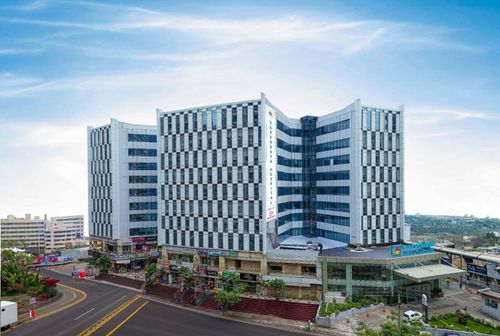Overview
Menstrual cycles typically occur every 28 days and last four to seven days, but variations can signal underlying issues. Flows that are significantly heavier, lighter, or cycles shorter than 21 days or longer than 35 days indicate abnormal menstruation.
At Sarvodaya Hospital, our dedicated team of specialists carefully assesses each woman’s unique situation and offers compassionate, evidence-based care. With advanced technology and a holistic approach, we provide effective and safe irregular menstruation treatment in Faridabad, supporting comfortable, healthier cycles for women at every stage of life.
Symptoms of Abnormal Periods (menstruation)
- Periods coming less than 21 days or more than 35 days apart
- Unusually heavy or light menstrual flow
- Missing/skipped periods (amenorrhea)
- Bleeding between periods (metrorrhagia)
- Periods that last longer than 7 days
- Severe cramping or pelvic pain
- Clotting or flooding during periods
Causes of Abnormal Periods (Menstruation)
- Hormonal imbalances (e.g., PCOS, thyroid issues)
- Stress, sudden weight loss or gain, excessive exercise
- Underlying medical conditions (fibroids, polyps, endometriosis)
- Certain medications (contraceptives, anticoagulants, etc.)
- Adolescence and perimenopause
- Chronic illnesses (diabetes, liver/kidney disorders)
- Infections or pelvic inflammatory disease
Diagnosis of Abnormal Periods (Menstruation)
Identifying the cause of abnormal periods begins with a thorough, patient-focused evaluation at Sarvodaya Hospital. Our team uses state-of-the-art diagnostics and a personalised approach to ensure you receive the most effective and comfortable irregular periods treatment in Faridabad.
- Detailed medical and menstrual history assessment: We take time to understand your cycle patterns, overall health, family history, and any symptoms to pinpoint potential causes of irregularity.
- Physical and pelvic examination: A careful examination helps detect structural or physical changes that may affect menstrual flow.
- Laboratory tests (hormone profiling, blood counts, thyroid tests): Blood tests assess hormone levels, screen for anaemia, and check thyroid function—key factors in menstrual balance.
- Imaging (pelvic ultrasound, sometimes MRI): Pelvic ultrasound provides clear images of the uterus and ovaries to reveal polyps, fibroids, or cysts; MRI may be recommended for more complex cases.
- Other tests (endometrial biopsy, hysteroscopy) if indicated: In certain cases, additional procedures such as an endometrial biopsy or hysteroscopy are performed to evaluate the uterine lining and rule out underlying conditions.
Treatment for Abnormal Periods
- Lifestyle modifications: We guide you in making healthy changes to your routine, improving nutrition, staying active, and managing stress, which can help restore menstrual balance naturally.
- Hormone therapy and oral contraceptives: For many women, hormonal treatments or birth control pills regulate cycles, manage symptoms, and reduce excessive bleeding.
- Non-hormonal medication: Medications such as NSAIDs or tranexamic acid offer targeted relief, especially for pain or heavy bleeding, without affecting hormones.
- Treatment of underlying cause: We investigate and treat any underlying conditions—like thyroid disorders, PCOS, or clotting issues—that may contribute to abnormal periods, ensuring a targeted abnormal menstruation treatment
- Minimally invasive surgical options for structural problems: When needed, we offer minimally invasive procedures, such as hysteroscopic removal of fibroids or polyps, and endometrial ablation, to correct structural issues causing abnormal bleeding.
- Advanced imaging and diagnosis: Sarvodaya Hospital features cutting-edge ultrasound, MRI, and diagnostic tools, ensuring precise identification and targeted therapy for all menstrual health concerns.
Prevention & Lifestyle Modification
Embracing healthier habits can play a key role in managing and preventing abnormal periods. At Sarvodaya Hospital, our team encourages a proactive approach to menstrual health, making us a reputed gynaecology Hospital in Faridabad, Delhi NCR for women seeking supportive, long-term solutions.
- Maintaining a healthy weight and regular exercise: Keeping your weight within a healthy range and staying active helps regulate hormones and stabilise menstrual cycles.
- Stress management techniques: Practising relaxation methods, such as yoga, meditation, or deep breathing, can reduce the impact of stress, a common disruptor of regular menstruation.
- Balanced diet rich in nutrients: A diet full of whole grains, fruits, vegetables, lean proteins, and healthy fats supports hormone balance and overall health.
- Avoiding smoking, excess alcohol: Steering clear of tobacco and limiting alcohol intake reduces the risk of menstrual abnormalities and supports better reproductive health.
- Early management of chronic illnesses: Promptly addressing conditions like thyroid disorders or diabetes, under your doctor’s guidance, helps prevent their impact on menstrual patterns.
Pre and Post-Treatment Lifestyle Modifications
Pre-treatment:- Undergo a complete health evaluation to identify individual risks and customise your intervention plan for the best outcomes.
- Tackle issues like anaemia or vitamin deficiencies in advance, as a nourished body responds better to treatment and recovers faster.
- Receive clear guidance on when and how to start or stop any medicines needed for your planned procedure to ensure safety and effectiveness.
- Follow your care team’s instructions for wound care, rest, and a step-wise return to school, work, or exercise, avoiding overexertion.
- Continue with a balanced diet and healthy lifestyle habits to support complete recovery and menstrual health.
- Watch for symptoms such as excessive bleeding, severe pain, fever, or unusual discharge, and contact your doctor if any occur for prompt attention.















